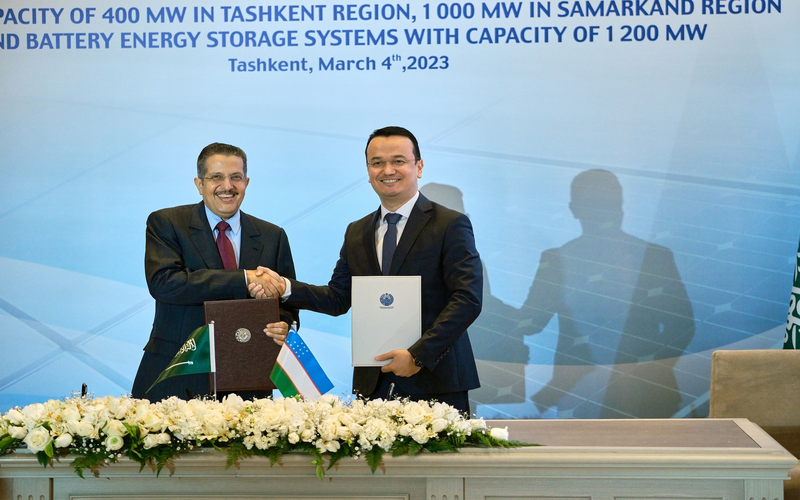Saudi Arabian energy giant ACWA Power says it has secured several power purchase agreements (PPAs) for 1.4 GW of solar power and 1.5 GWh of storage capacity from Uzbekistan’s Joint-Stock Company (JSC) National Electric Grid of Uzbekistan (NEGU) and the country's Ministry of Investment, Industry and Trade.
The solar capacity will be distributed across three PV projects in Tashkent and Samarkand. The storage capacity will be installed in Tashkent, Bukhara and Samarkand.
“The Tashkent projects will include a 400 MW PV plant and 500 MWh BESS, while two 500 MW PV projects each and a 500 MWh BESS will be developed in Samarkand,” the company said in a statement. “Another 500 MWh BESS will be located in Bukhara, and the project will include overhead transmission lines to help dispatch power to the grid.”
ACWA did not reveal any additional details about the projects.
Uzbekistan is currently supporting large-scale PV through a series of auctions. The latest procurement exercise assigned 500 MW of solar projects in the Namangan, Bukhara, and Khorezm regions. Abu Dhabi-based developer Masdar secured the project in the Bukhara region with a bid of $0.03044/kWh. The 250 MW plant will be connected to a 62 MW storage facility.
A consortium led by PowerChina secured the 150 MW project in Uzbekistan’s Namangan region. The group offered a final price of $0.04828/kWh. French developer Voltalia won the project in the Khorezm region with a bid of $0.02888/kWh.
The country aims to deploy 8 GW of solar by 2030. According to the International Renewable Energy Agency (IRENA), the country had only installed 104 MW of solar by the end of 2021.
This content is protected by copyright and may not be reused. If you want to cooperate with us and would like to reuse some of our content, please contact: editors@pv-magazine.com.




By submitting this form you agree to pv magazine using your data for the purposes of publishing your comment.
Your personal data will only be disclosed or otherwise transmitted to third parties for the purposes of spam filtering or if this is necessary for technical maintenance of the website. Any other transfer to third parties will not take place unless this is justified on the basis of applicable data protection regulations or if pv magazine is legally obliged to do so.
You may revoke this consent at any time with effect for the future, in which case your personal data will be deleted immediately. Otherwise, your data will be deleted if pv magazine has processed your request or the purpose of data storage is fulfilled.
Further information on data privacy can be found in our Data Protection Policy.